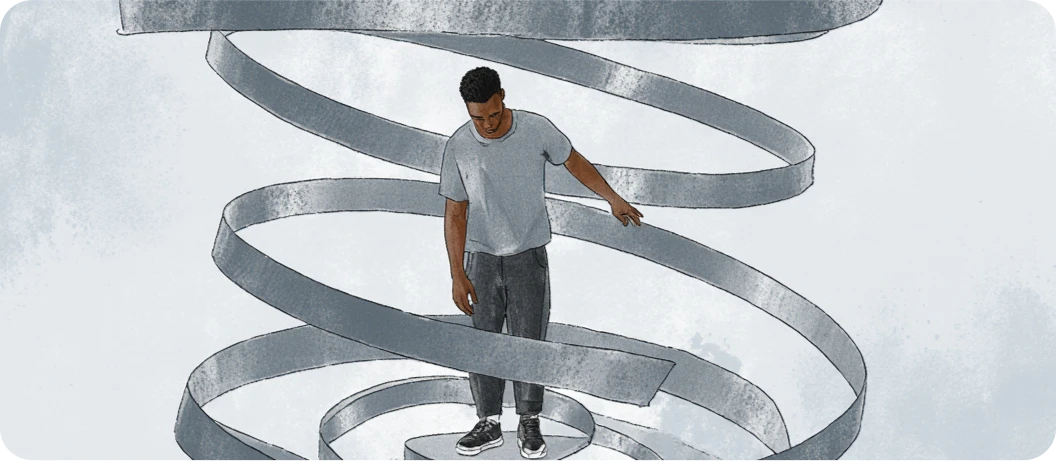Shame can be a deeply unpleasant emotion that can quickly take control of us. According to Brené Brown, a professor and best-selling author, guilt is the feeling that you have done something wrong, whereas shame is the feeling that you are bad and unworthy of love. When shame spirals, it can feel like an endless cycle of negative self-talk, judgment, and isolation.
In this article, we’ll look at shame spirals and how to recognize them. We’ll also learn how it can have a negative impact on mental health and how to break the cycle of shame.
What Is a Shame Spiral?
A shame spiral is a cycle of negative thoughts, emotions, and behaviors triggered by intense feelings of shame that can lead to a deep sense that you are fundamentally flawed and severe self-criticism.
A shame cycle begins when you experience a moment of embarrassment or self-doubt triggered by some event and quickly escalates into an all-consuming internal feeling of inadequacy. Instead of moving through the emotion of shame, you can be trapped in a downward spiral (shame spiral trauma) where shame triggers more shame, leaving you feeling worse than before.
Triggers for intense feelings of shame
Childhood trauma, such as emotionally neglectful environments or narcissistic parenting styles, is the leading cause of chronic shame. These experiences form shame-based belief systems in children and promote negative self-perception.
As adults, certain triggers can evoke painful memories from our childhood, leading us to withdraw emotionally and engage in negative self-talk. These are some examples of triggers:
- When someone, especially an authority figure or a loved one, criticizes or disapproves of you
- Making a mistake in the workplace, school, or public
- Feeling rejected in relationships, social situations, or online
- Not meeting personal expectations or perfectionist standards
- Social comparison, i.e, on social media
- Reliving childhood experiences tied to humiliation or blame
- Feeling emotionally exposed after sharing something vulnerable
If you’re finding that feelings of shame are overwhelming or persistent, it might be helpful to explore any deeper emotional patterns, such as childhood trauma, that could be influencing these responses.
How to Recognize Shame Spiral Signs
Some common signs include:
1. You criticize yourself harshly
You may find that you are becoming more critical of yourself for seemingly insignificant flaws. A vicious cycle of self-loathing can begin when negative thoughts like “I’m so foolish” or “I can never do anything right” dominate your internal monologue. For instance, if you have trouble pronouncing words when speaking, you might convince yourself that you are awkward or that you constantly humiliate yourself.
Does your own emotional fragility ever send you into a shame spiral?
2. You begin to avoid people
When your feelings of shame increase, you might want to avoid people or situations that could make you feel even worse. A shame spiral can take the form of avoiding social gatherings, skipping meetings, or withdrawing from friends and family. Overwhelming fear of rejection or judgment can result in feelings of loneliness and a belief that no one is interested in you.
Are you the type of person who avoids eye contact, second-guesses every sentence, or struggles to speak up in front of a crowd? Take the social anxiety quiz to understand the roots of the fear of social interactions.
3. You replay past mistakes over and over in your mind
Experiencing shame spirals can involve compulsive thoughts about past mistakes or instances in which you felt embarrassed or judged [2]. You may mentally relive a conversation, asking yourself, “Why did I say that? They most likely believe that I am now a fool.” Another example is when you make a minor error at work, such as sending a typo in an email, and you spend hours or even days worrying about how it will impact your career.

4. You have physical symptoms of stress
Shame can manifest physically, leading to stress-related symptoms. The shame spiral’s emotional intensity can cause physical discomfort, which adds to the overwhelming feeling of the situation. These symptoms are intimately linked to the fight-or-flight response, where the body reacts to perceived threats.
These symptoms of emotional distress may manifest in this situation:
- You may experience a constriction in your chest, shallow breathing, or even a racing heart when you reflect on a past error or fret about a potential one.
- A sense of heaviness may develop, making it feel like you’re carrying a weight on your shoulders, or you may feel fatigued and drained of energy.
- As a desire to physically escape the situation, like wanting to leave a room or go to a private space to avoid dealing with your feelings.
5. You have catastrophic thinking
Within a shame spiral, you may begin to believe that even minor mistakes will have disastrous consequences, making you feel even more anxious and powerless. “This is the end of our friendship, and I’ll be alone forever,” you conclude after a fight with a friend who now probably hates you, as an example of such catastrophic thinking.
Can Shame Spirals Negatively Impact Mental Health?
Shame spirals can have significant adverse effects on mental health and emotional well-being, according to research [1]. Chronic feelings of shame are associated with a number of mental health conditions, including:
- Constant shame can trigger feelings of hopelessness and despair, which are common symptoms of depression [3].
- According to the same research, people may use unhealthy coping mechanisms such as binge-eating or substance abuse to numb or escape negative emotions and shame [3].
- Shame can increase anxiety, particularly social anxiety. According to a 2021 study [4], fear of judgment or rejection can cause excessive worry and avoidance and exacerbate feelings of anxiety and isolation.
- A shame spiral and low self-esteem can lead to withdrawal, fear of rejection, or self-sabotage in relationships, which increases loneliness and makes it difficult to connect with others.
Expert Insight
In my experience, shame spirals significantly impact the mental health of therapy clients. Shame is a profoundly isolating emotion that convinces a person they are flawed at their core. This faulty belief leads to patterns of self-criticism and withdrawal from meaningful connections. Over time, shame can erode self-esteem and contribute to maladaptive behaviors such as avoidance or self-sabotage. By addressing shame in therapy, clients can reclaim a sense of agency and begin to foster healthier emotional resilience.
Rychel Johnson
Mental health professional
How to Stop a Shame Spiral — 6 Helpful Tips
If you wonder, “How to stop worrying about everything?” here’s how you can start the healing process and break free from a shame cycle:
1. Pause and breathe
When you notice the negative feelings start to engulf you, pause for a moment. To do so, slow down your breathing to calm your nervous system and reduce the intensity of your negative emotions. Then try inhaling for four counts, holding for four, and exhaling for four.
2. Ground yourself in the present
To stop the shame spiral, focus on the present moment. Grounding techniques, such as focusing on your breath, engaging in physical sensations such as feeling the ground beneath your feet, or engaging in mindful activities, can help bring you back to the here and now.
3. Accept your shame without being judged
You may feel really ashamed, but that doesn’t make you less of a person. “I’m feeling ashamed right now,” you can say to yourself with self-compassion to help yourself separate the distorted beliefs from who you are and overcome shame. Don’t let your feelings determine your worth; remember that they are only temporary.
4. Challenge those of your negative thoughts
Shame spirals may involve automatic, negative self-talk. Shame spirals may include negative self-talk that happens without thinking. With logic and self-compassion, start to fight these thoughts. Think about things like
- Are the facts behind this thought, or am I making it up?
- If a friend were feeling bad about themselves, would I tell them this?
- What’s a fairer and considerate way to look at this?
5. Reframe your mistakes as opportunities
Instead of seeing your mistakes as evidence that you’re unworthy or incompetent, try to reframe them as opportunities for growth. Here is an example: instead of saying, “I made a mistake, but that doesn’t mean I’m a failure” change the narrative to a slightly more positive way, “I can learn from this.”
6. Talk to someone you trust
Sharing your feelings with someone you trust is one of the best ways to end a cycle of shame. One of your family members or close friends could be this person. If you feel alone when talking about your experience, remember that everyone feels ashamed sometimes. Talking about it can help you feel seen and supported.
From Personal Experience
After presenting at work, Emma heard some people laughing and whispering. She thought, “I sounded so stupid,” as soon as she felt a wave of heat rise in her chest. Everyone is criticizing me. The shame spiral took over on the train ride home; she listened to every word again, certain that she had made a fool of herself.
At this point, she discovered the Breeze app and used the feeling journal to identify her emotions of shame, self-doubt, and fear. Seeing it written out gave her some distance. Emma then calmed her nervous system with a quick grounding exercise from the app.
When to Seek Professional Help
Overall, if shame becomes a barrier in your life, interfering with your relationships, work performance, sleep, or self-care routines, you should consult a therapist. If you are using drugs, self-harming, exhibiting disordered eating symptoms, reactive abuse, or using other coping mechanisms to suppress negative emotions, you should definitely seek professional help. These behaviors may provide temporary relief, but they frequently exacerbate the spiral over time.
Rychel Johnson, a licensed clinical professional counselor, explained how to stop replaying past mistakes in mind.
Replaying past mistakes is a natural but often unhelpful response to feelings of regret or self-doubt. Practicing self-compassion is important—remind yourself that everyone makes mistakes. When intrusive thoughts arise, acknowledge them without judgment, then gently redirect your focus to the present moment. Mindfulness techniques and journaling about your thoughts may provide clarity and a chance to process your emotions. Remember, healing is a process, and each step forward counts.
Sources
- Harvard Business Review. Don’t Let Shame Become a Self-Destructive Spiral. June 01, 2017.
- ResearchGate. Undoing the shame spiral: working with a narcissistic client trapped in a self-hating depression. November 2010.
- ScienceDirect. Shame mediates the relationship between depression and addictive behaviors. July 2018.
- ScienceDirect. The role of shame and guilt in social anxiety disorder. December 2021.
Disclaimer
This article is for general informative and self-discovery purposes only. It should not replace expert guidance from professionals.
Any action you take in response to the information in this article, whether directly or indirectly, is solely your responsibility and is done at your own risk. Breeze content team and its mental health experts disclaim any liability, loss, or risk, personal, professional, or otherwise, which may result from the use and/or application of any content.
Always consult your doctor or other certified health practitioner with any medical questions or concerns
Breeze articles exclusively cite trusted sources, such as academic research institutions and medical associations, including research and studies from PubMed, ResearchGate, or similar databases. Examine our subject-matter editors and editorial process to see how we verify facts and maintain the accuracy, reliability, and trustworthiness of our material.
Was this article helpful?




